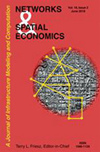Networks and Spatial Eonomics (NETS) is devoted to the mathematical and numerical study of economic activities facilitated by human infrastructure broadly defined to include technologies pertinent to information telecommunications the Internet transportation energy storage and transmission and water resources. Because the spatial organization of infrastructure most generally takes de form of networks the journal encourages submissions that employ a network perspective. However non-network continuum models are also recognized as an important tradition that has provided great insight into spatial economic phenomena; consequently de journal welcomes with equal enthusiasm submissions based on continuum models. In light of its scope the intended readership of and contributors to NETS are spatial economists geographers regional scientists applied mathematicians operations research analysts infrastructure engineers and other researchers concerned with the spatial organization and operation of infrastructure in both the public and private sectors. Indeed the journal's Editorial Board is drawn from just such a mature of disciplines. NETS is committed to high standards of originality and creativity for the papers it publishes. At the same time NETS is committed to a timely review process. All submissions are to be sent initially to Kluwer's journal Editorial Office (JEO) from where the Editor-in-Chief will assign them to relevant Area Editors following a preliminary evaluation. A single blind refereeing system whereby the authors do not know the names of the referees assigned to their manuscripts by the Area Editors is employed. In most cases two referee reports will be solicited. Based on these reports Area Editors make a publication recommendation to the Editor-in-Chief who decides the final disposition of each manuscript. The journal welcomes the full spectrum of high quality work in networks and spatial economics including theoretical studies case studies and algorithmic investigations as well as manuscripts that combine these aspects. Although not devoted exclusively to theoretical studies the journal is 'theory-friendly'. That is well thought out theoretical analyses of important network and spatial economic problems will be considered without bias even if they do not include case studies or numerical examples.
